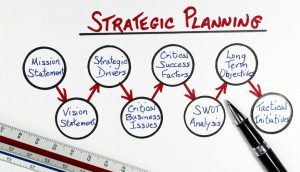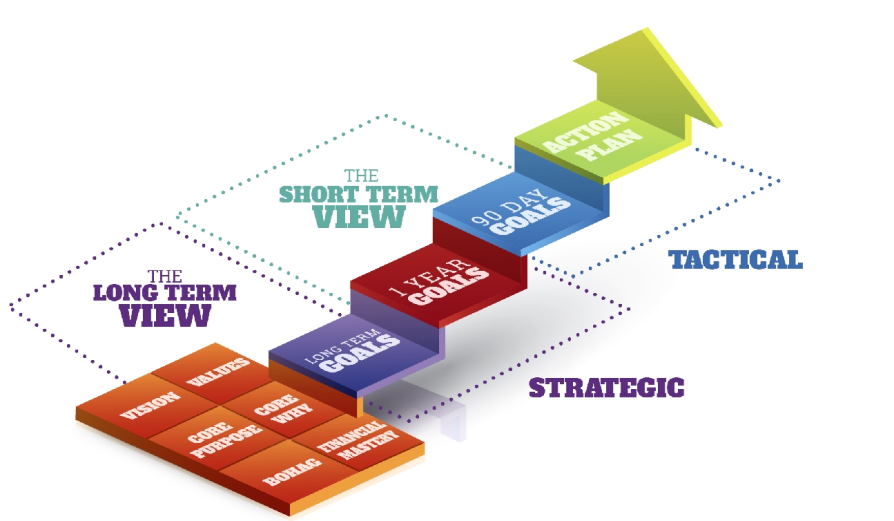
Strategic Planning: What It Is and Why Your Business Needs It
— 2022-03-28Having a clear and effective way to plan for the future of your business is essential to its success. Strategic planning allows you to think through how best to reach your goals, clearly define roles and responsibilities, allocate resources efficiently, anticipate challenges ahead of time, and proactively manage risks. In today’s fast-paced business world an organization can’t afford not to have a strategic plan in place — it’s critical for long-term growth and sustainability. In this blog post we will dive into exactly what strategic planning is and why it’s important for businesses of all sizes. With valuable insight from industry experts, this post will provide you with guidance on developing an effective strategy for steering your organization towards success in the years ahead!
The benefits of strategic planning in business
It helps set clear goals and objectives, creates a framework for decision making, provides an assessment of the company’s current state and future possibilities, and outlines specific strategies to reach these goals. Strategic planning also helps align resources with vision, identify potential risks and opportunities that may arise in the short- or long-term, create accountability throughout the organization, and create a culture of excellence within the business. Additionally, strategic planning can help build a strong team by setting expectations around roles and responsibilities so everyone is working towards common goals. Finally, it ensures that all stakeholders are on board with the objectives of the company so they can be worked towards in unison. By taking time to plan strategically for your business you can ensure you have a clear vision, effective strategies and a team of people who are all working towards the same goals. This will help you maximize your chances of success in the marketplace.

Strategic planning also helps you to create an actionable plan by mapping out how you can reach your objectives. It outlines what steps need to be taken, when they should be taken, and who or what resources you may need to achieve those goals. By taking a step-by-step approach to achieving your desired outcomes, it allows for greater control over timeframes and budgets as well as better assessment of progress along the way so that changes can be made if needed. Strategic planning also enables organizations to stay ahead of their competitors by anticipating future trends in the market so that they can adjust their strategies accordingly and remain competitive.
Overall, strategic planning can be a great tool to help business owners and leaders achieve their desired outcomes while helping the organization stay ahead of the game. By setting clear objectives and using the right tools and resources to reach them, businesses can position themselves for success in today’s ever-changing landscape.
By using strategic planning, businesses will also benefit from improved communication between departments as everyone is working towards common goals with greater clarity on individual roles and responsibilities. This will lead to more efficient decision making processes, fewer conflicts between different stakeholders, improved collaboration among teams, and ultimately better overall performance. Furthermore, it helps ensure that everyone is informed about all aspects of the business, from upcoming changes and initiatives to financial goals and objectives. This allows for better alignment between the different teams, which can lead to greater efficiency, cost savings, and ultimately more success in the long run.
Ultimately, strategic planning is an invaluable tool that can help business owners and leaders succeed by providing them with a clear vision, actionable plans, and resources necessary to reach their desired outcomes. By doing so they will be able to stay ahead of the competition, improve communication across departments, create a culture of excellence within the organization, and maximize their chances of success in today’s ever-changing landscape.

How to create a business plan that will get you results
Creating a business plan is no small feat, but it is essential if you want to succeed in achieving your goals. There are many elements that need to come together in order to create a successful plan, and it’s important that each piece plays an integral role in helping you reach your desired outcome. Here are some key tips for creating an effective business plan:
- Establish Clear Goals – Define what success will look like for your business and set measurable goals that will help you get there. Be sure to include short term objectives as well as long-term ones so that you can track progress over time.
- Research Market Trends – Conduct research into current trends within the market relevant to your industry or niche. This will help you understand the landscape and make informed decisions on how to best position your business in order to take advantage of opportunities while avoiding potential risks.
- Create a Sales & Marketing Plan – Develop a strategy for how you will market and sell your products or services. Consider what channels you’ll use, who your target customers are, and what kind of messaging will be most effective in reaching them.
- Set A Budget – Determine how much money you have available to invest in starting up and running the business over time. Make sure that all costs associated with operations, marketing, personnel, etc., are accounted for in order to avoid any surprises down the line.
- Hire Personnel – Determine which personnel you will need to hire in order to successfully run your business. Consider the skills and experience needed in order to best serve your customers as well as what kind of budget you have available for salaries and benefits.
By following these tips, you should be able to create a solid business plan that will help put your company on the path towards success. With proper planning and preparation, you can set yourself up for long-term growth and profitability.































